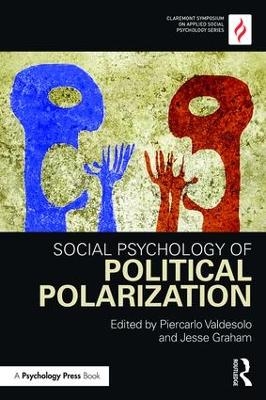
Social Psychology of Political Polarization
Routledge (Verlag)
978-1-138-81064-8 (ISBN)
Piercarlo Valdesolo is Assistant Professor at Claremont McKenna College, California. Using methodology from social and cognitive psychology, his research focuses on how our emotional states -- such as compassion, awe, and gratitude -- affect our decisions and behaviors with regard to trust, cooperation, blame, and punishment. Jesse Graham is Assistant Professor of Psychology at the University of Southern California Dornsife. His research is centered on morality and ethics, ideology, values, political psychology, implicit attitudes, religion, culture, and social justice.
Bridging Ideological Divides, Piercarlo Valdesolo & Jesse Graham. Understanding Ideological Differences in Explanations for Social Problems, Linda Skitka. Ideological Differences in the Expanse of the Moral Circle, Adam Waytz. Moral Coherence and Political Conflict, Peter H. Ditto. Restraining Selfishness or Enabling Altruism: Moral Motives and Political Ideology, Ronnie Janoff-Bulman. The Left-Right Landscape Over Time: The View from a Western-European Multi-party Democracy, Hulda Thórisdóttir. Liberals and Conservatives Are (Geographically) Dividing, Matt Motyl. How We Think Affects What We Think: The Effects of Construal Level on Political Polarization Between Liberals and Conservatives, Jaime Napier. How Social Psychological Errors and Biases Consistently Distort "Received Wisdom" in Ways that Bolster a Liberal Worldview, Lee Jussim. Why We Should Care About Ideological Diversity in Social Psychology,Yoel Inbar.
| Erscheint lt. Verlag | 17.2.2016 |
|---|---|
| Reihe/Serie | Claremont Symposium on Applied Social Psychology Series |
| Zusatzinfo | 3 Tables, black and white; 5 Line drawings, black and white; 10 Halftones, black and white |
| Verlagsort | London |
| Sprache | englisch |
| Maße | 152 x 229 mm |
| Gewicht | 294 g |
| Themenwelt | Geisteswissenschaften ► Psychologie ► Allgemeine Psychologie |
| Geisteswissenschaften ► Psychologie ► Sozialpsychologie | |
| Mathematik / Informatik ► Mathematik | |
| Sozialwissenschaften ► Politik / Verwaltung ► Politische Systeme | |
| Sozialwissenschaften ► Politik / Verwaltung ► Politische Theorie | |
| Sozialwissenschaften ► Politik / Verwaltung ► Staat / Verwaltung | |
| ISBN-10 | 1-138-81064-9 / 1138810649 |
| ISBN-13 | 978-1-138-81064-8 / 9781138810648 |
| Zustand | Neuware |
| Haben Sie eine Frage zum Produkt? |
aus dem Bereich


